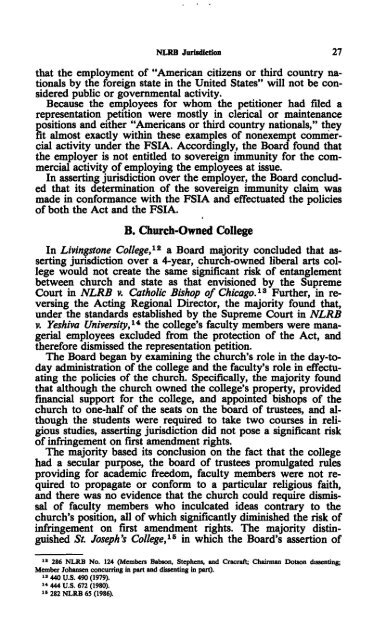Operations In Fiscal Year 1988 - National Labor Relations Board
Operations In Fiscal Year 1988 - National Labor Relations Board
Operations In Fiscal Year 1988 - National Labor Relations Board
You also want an ePaper? Increase the reach of your titles
YUMPU automatically turns print PDFs into web optimized ePapers that Google loves.
NLRB Jurisdiction 27that the employment of "American citizens or third country nationalsby the foreign state in the United States" will not be consideredpublic or governmental activity.Because the employees for whom the petitioner had filed arepresentation petition were mostly in clerical or maintenancepositions and either "Americans or third country nationals," theyfit almost exactly within these examples of nonexempt commercialactivity under the FSIA. Accordingly, the <strong>Board</strong> found thatthe employer is not entitled to sovereign immunity for the commercialactivity of employing the employees at issue.<strong>In</strong> asserting jurisdiction over the employer, the <strong>Board</strong> concludedthat its determination of the sovereign immunity claim wasmade in conformance with the FSIA and effectuated the policiesof both the Act and the FSIA.B. Church-Owned College<strong>In</strong> Livingstone College," a <strong>Board</strong> majority concluded that assertingjurisdiction over a 4-year, church-owned liberal arts collegewould not create the same significant risk of entanglementbetween church and state as that envisioned by the SupremeCourt in NLRB v. Catholic Bishop of Chicago." Further, in reversingthe Acting Regional Director, the majority found that,under the standards established by the Supreme Court in NLRBv. Yeshiva University," the college's faculty members were managerialemployees excluded from the protection of the Act, andtherefore dismissed the representation petition.The <strong>Board</strong> began by examining the church's role in the day-todayadministration of the college and the faculty's role in effectuatingthe policies of the church. Specifically, the majority foundthat although the church owned the college's property, providedfmancial support for the college, and appointed bishops of thechurch to one-half of the seats on the board of trustees, and althoughthe students were required to take two courses in religiousstudies, asserting jurisdiction did not pose a significant riskof infringement on first amendment rights.The majority based its conclusion on the fact that the collegehad a secular purpose, the board of trustees promulgated rulesproviding for academic freedom, faculty members were not requiredto propagate or conform to a particular religious faith,and there was no evidence that the church could require dismissalof faculty members who inculcated ideas contrary to thechurch's position, all of which significantly diminished the risk ofinfringement on first amendment rights. The majority distinguishedSt. Joseph's College," in which the <strong>Board</strong>'s assertion of12 286 NLRB No. 124 (Members Babson, Stephens, and Cracraft; Chairman Dotson dissenting;Member Johansen concurring in part and dissenting in part).13 440 U.S. 490 (1979).14 444 U.S. 672 (1980).15 282 NLRB 65 (1986).
















